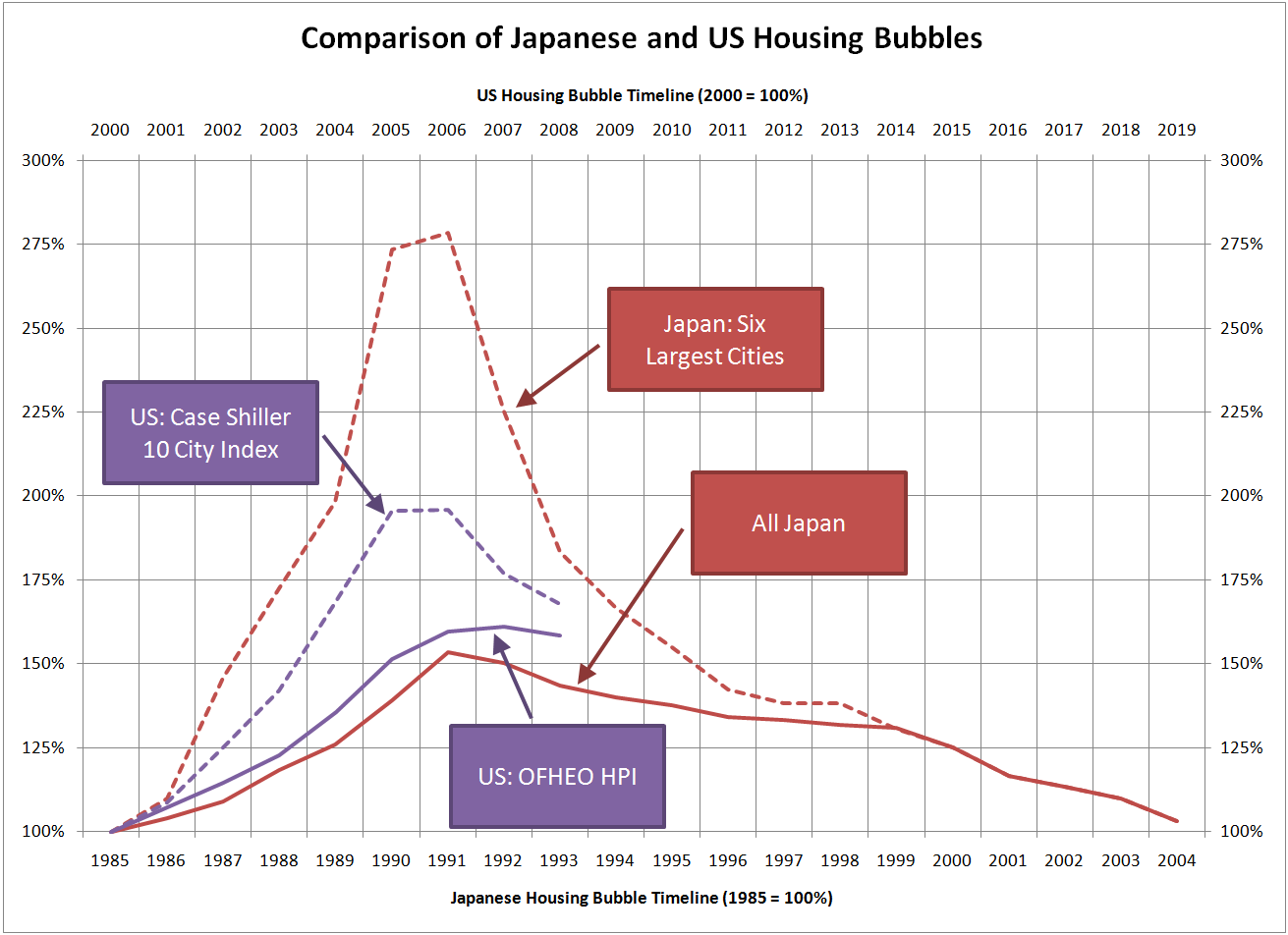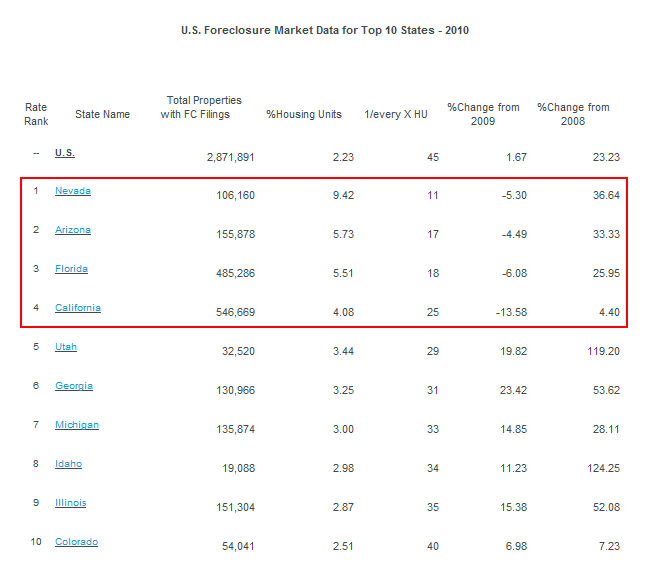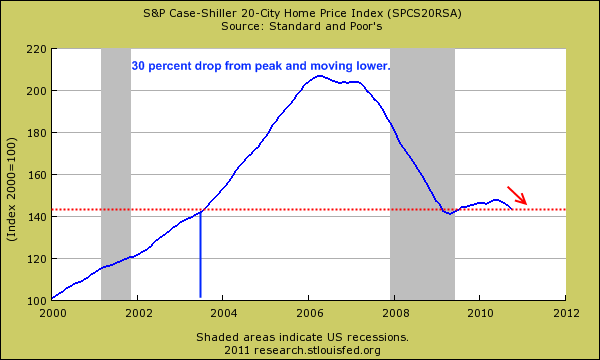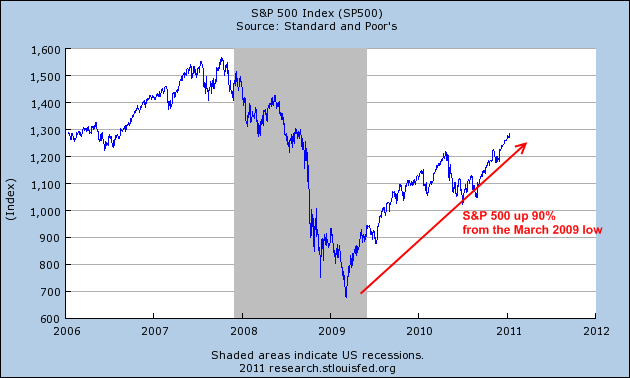The road least pillaged – S&P 500 up 90 percent from bottom but housing values down 30 percent nationwide. Wealthy store most of their wealth in stocks while most Americans have their net worth in housing. 2010 record year in foreclosures and the upcoming lost decade in housing.
- 2 Comment
There are few investments in the US that are so heavily subsidized like housing. Residential and commercial real estate included benefit from favorable government policies to increase demand. Some of these policies may have merit but a large part of the housing market has been injected with so many perks that the true value of a home has been stripped out. This is what makes the crash in real estate even more dramatic. Real estate has and is declining in value even in spite of all the generous benefits of owning. How can that be when the government has made buying a home such a lucrative financial move on paper? First, the purpose of buying a home has been lost in the massive investment banking and government casino machine. Instead of buying a home for a steady 30 year time period home buying turned into a giant operation where churning sales was favored over sustained and stable growth. This was a mission set back in the 1930s when the government stepped in to subsidize the housing market. The intent was to create stable communities and pride in owning a home. Much of that was picked away like meat from a carcass as Wall Street figured out a way to develop archaic investment instruments to turn housing into another commodity like oil or stock options. For all of the tragic financial issues in housing we are now likely to see a 2011 through 2020 Japanese like stalling out in home values.
2010 record number of foreclosures
Source:Â RealtyTrac
For all the talk about an economic recovery it definitely is not happening in residential real estate. 2010 goes down in the history books as the year with the highest number of foreclosures. 2,800,000+ foreclosure filings where issued in 2010. 45 percent of these fillings occurred in the four hardest hit states of California, Florida, Arizona, and Nevada. In the last quarter of 2010 foreclosure filings did move lower but this was largely due to banks figuring out better ways to plunder average Americans because as it turns out, banks did not really monitor and carefully track the paperwork associated with their mortgages. It is a telling story and a repudiation of our banking sector that the biggest purchase for most Americans, that is their home, did not even have the proper structure in place to seamlessly track the paperwork. As it turns out the cash register at a local McDonalds does a better job of keeping track who owes what on what.
The above chart is troubling to see and it really shows that the largest part of American’s net worth is still largely on shaky ground. 1 out of every 45 homes in the US had a foreclosure filing placed on it in 2010. 14 out of every 100 mortgages were either in foreclosure or simply had someone that was no longer making normal payments on the property. Much of this has to do with the fact that the middle class of America is shrinking like a grape in the sun and has seen the largest wealth destruction ever recorded. We would have to go back to the Great Depression to see similar wealth being pillaged and destroyed. Yet the wealthiest in this country continue to pull away from the working and middle class as they continue to shelter their money in the stock market and payoff politicians for favorable protections. There is a significant reason why you did not get a bailout but Goldman Sachs and Morgan Stanley were handed blank checks of billions of dollars.
As we have mentioned housing is where most of Americans have their net worth. So if we look at this one asset class we can understand why many middle class Americans simply do not buy into the recovery talks:
Housing values have fallen by 30 percent from their peak and are likely to fall even further (that typically happens with millions of foreclosures). Measure the above chart with that of the S&P 500 where most of the top 1 percent stores their wealth:
The S&P 500 Index is up a stunning 90 percent from the low reached in March of 2009. Yet all measures of “recovery†are largely absent for most Americans:
-Home values have fallen by 30 percent from their peak and will continue to fall
-Unemployment is still near its peak
-New job growth is occurring in lower paying sectors of the economy
-1 out of 3 Americans has no retirement savings so the stock market largely has little impact on them
-Banks after being bailed out continue to swindle the American public, the same public that paid for their survival
-The government is largely focused on sheltering and protecting their plutocracy on Wall Street
So it should not come as a surprise that most Americans are not exactly dancing for joy in the streets as they see the stock market rally back up. A stock does not pay the mortgage or pay the monthly heating bill and the record number of foreclosures in 2010 should sum this up rather nicely. The massive income inequality in the United States is similar to the few years before the 1929 stock market crash. This does not imply that a stock market crash will happen but when income inequality gets this skewed you start having the seeds of a system that is unsupportable. A person losing their home is not a good sign for the middle class. A million people losing their home is not a good sign for the American banking system.
The path US housing is on is similar to that of Japan:

Source:Â Seattle Bubble
People only a few years ago could not even comprehend a lost decade in real estate values. That is now largely baked in the cake. Japan has had two decades of lost values in real estate. Given the massive problems and income inequality in our country there is little reason to believe that home values would suddenly jump up from now until 2020. What is going to push prices up? Wages? There is no evidence for that. Home values even after the recent crash are overvalued based on the wages of current American families. Half of all American workers make $25,000 a year or less. How can that support the median home price of $170,000? So you combine two incomes and reach the typical median household income of $50,000. In this age of multiple career transitions and shifting industries can anyone be certain of 30 year employment? That is the big difference now. Even 30 years ago one income was enough to handle the median home payment in the US. Now, two incomes are just enough to stretch into the median priced home via massive amounts of debt.
Clearly something will have to give. It is hard to imagine wages just blasting upwards in the next decade. What about the large numbers of baby boomers who will likely downsize and add even more housing stock to the market? It is hard to see how things continue the way they are. Lower home prices will generate more sales as we are seeing in hard hit areas. Yet this correction will not be uniform. Look at places like Detroit Michigan. You can buy homes for a few hundred dollars but so what? You can also buy a home for cheap in rural places in Asia or maybe a piece of land in Antarctica. Ultimately a home has to be tied to a local economy. When people forget that housing is simply one part of a larger eco-system they end up pumping money into bubbles like the one we just lived through and it ultimately only had the ability to grow because of the fertilizer of exotic mortgages.
Housing is likely to be a very poor performing investment in the next 10 years. Just look at the balance sheet of average Americans and you will understand why.
If you enjoyed this post click here to subscribe to a complete feed and stay up to date with today’s challenging market!2 Comments on this post
Trackbacks
-
GrayCloud said:
You state: “The S&P 500 Index is up a stunning 90 percent from the low reached in March of 2009. Yet all measures of “recovery†are largely absent for most Americans…”
What does that tell you about the nature – or reality – of the rally in question?
You further state: “The massive income inequality in the United States is similar to the few years before the 1929 stock market crash. This does not imply that a stock market crash will happen but when income inequality gets this skewed you start having the seeds of a system that is unsupportable.”
You seem loathe to call this “massive income inequity” what it is – a fiscal ticking time bomb. In other words:
“Crash” may be an understatement.
January 14th, 2011 at 10:02 am -
clarence swinney said:
What is this called?
10% own 70% Net Wealth——80% own 15%
10% own 70% Financial Wealth-80% own 7%
10% get 46% individual Income-70m get 13%20% own 85% Net Wealth
20% own 93% Financial Wealth
50% get 87% Individual Income3rd world?
December 13th, 2011 at 7:33 am



 If you enjoyed this post click here to subscribe to a complete feed and stay up to date with today’s challenging market!
If you enjoyed this post click here to subscribe to a complete feed and stay up to date with today’s challenging market!